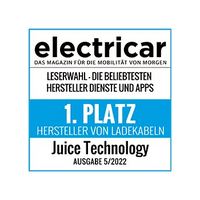Mistake No. 1: If everyone drove electric, there would be far too little electricity.
Far from it. If all (ALL!) cars were electric, total electricity consumption would increase by just 9%. Unbelievable, isn't it? The reason lies in the astonishing efficiency of electric cars. That might give you something to think about...
In other words: We could all switch to electric driving immediately and could even cover the additional consumption with the existing power plants!
Mistake No. 2: There is still
too few electric charging stations.
There are already over 1000x more electric charging stations than petrol filling stations. In Germany alone, there are now over 60 million electric charging points. That should actually be enough, right?
The mistake in thinking is that you no longer have to drive to gas stations with electric cars. You charge them wherever you are. There are already handy mobile but still powerful chargers such as the JUICE BOOSTER. This means you can charge them at ANY industrial socket (and at any household socket anyway).
In other words: you charge electric cars while you park anyway. It's that simple.

Misconception No. 3: The overall ecological balance of electric cars is worse than that of combustion engines.
Batteries can now be 100% recycled, the driving power can be produced 100% CO2-neutrally using water, wind and sun, and the car easily lasts more than three times as long as a petrol car due to the lack of breakable parts.
And: No exhaust gases, no oil dripping into the groundwater, no tanker accidents, no fracking, no grey energy in heavy oil transport, no disposal of used oil and filters, and so on.
In addition, electric vehicles use 90% of the energy supplied for propulsion, while petrol vehicles only use 15%. The rest is used as heat.
But this really gives you something to think about: refining a single liter of gasoline uses 1.5 kWh of electricity. But with this electricity alone, an electric car can travel 8 to 12 km. We dare say that an electric car can run solely on the energy that is wasted in extracting, transporting, refining and distributing the gasoline. Not counting the oil itself, which could therefore remain in the ground.
In other words: Mistake No. 3 is the desperate dream of the oil companies and combustion engine manufacturers. But it is long gone.
Mistake No. 4: The ranges are still completely insufficient.
Point 1: The average European (yes, Germans included) drives 60 km per day. Today, any electric car can easily manage that.
Point 2: See misconception 2: Today, you charge your car wherever you park. Then you have a full tank every time you leave. That's how efficiency works.
Point 3 : And if you really have to drive a lot and far, then just take a Tesla Model S. It can do 400 km and there is already a FREE Tesla-owned, brutally fast charging network that will take you from Hamburg to Genoa.
In other words: The range problem is the Nessie of e-mobility: frightening, legendary and no one has ever seen it.

Mistake No. 5: Nobody wants to stand around in the gas station shop for 4 hours until the electric car is full.
It's true that nobody wants to stand around at the gas station for four hours. But the misconception is that you never have to go to the gas station again.
The hardest thing about e-mobility - it seems - is getting people to stop using the old, complicated processes ;-)
In other words, see misconception number 2.
Misconception No. 6: Electric cars are too heavy and not efficient.
Regarding weight:
BMW i3: 1195 kg. BMW 118i: 1295 kg, Audi A1: 1210 kg.
The Stromer is the lightest...
Or:
Tesla Model S: 2150 kg. BMW 750i: 1945 kg, Lexus LS 600: 2345 kg, Mercedes S 500: 1955 kg, Bentley Continental: 2475 kg
The electric car is well within the average...
And then to efficiency:
In practice, a BMW i3 consumes an average of around 180 Wh per kilometer, a Tesla Model S around 220 Wh. This corresponds to around 1.6 - 1.9 liters of gasoline per 100 km.
In other words: Electric cars are insignificantly heavier and still consume only a quarter of the energy.
Misconception No. 7: Electric cars are quiet and that is dangerous.
Electric cars are actually pleasantly quiet. In a world of constant acoustic noise, this is a blessing.
And it does something to you: It calms you down and relieves stress. This means you can drive more calmly in the area around pedestrians without suffering. The interesting thing is: even if they hardly hear the car, they notice it without getting annoyed. Without a bell or horn. Just like that.
A contribution to world peace, so to speak.
In other words: Roaring and blaring no longer correspond to the spirit of the times. Quiet is more sophisticated, chic, modern.
Mistake No. 8: Electric would be great, but the technology is not yet mature and too expensive.
The funny thing is: there is almost no technology at all. A battery, an electric motor, that's it. And both are already surprisingly mature.
Regarding the price: It is true that the costs are shifted towards the purchase price. The less you have to spend on maintenance and energy.
In other words: electric cars are usually more financially attractive than vehicles with conventional engines after just three years.

Misconception No. 9: Hybrid cars are more practical because you can also run on gasoline.
Carrying two engines doesn't really make sense. They have to be produced and then disposed of later. An additional petrol engine is probably intended to curb range anxiety. But we've already discussed this topic at length. ;-)
The hybrid concept is a bit reminiscent of the Ford T. Some people also seemed to want to take a horse with them so that they could still have a previous generation drive if needed.
In other words: The concept of electric cars is to drive more easily and efficiently. Ergo, hybrid is a step in the wrong direction.
Mistake No. 10: A car simply has to have a great sound.
It sounds strange, but it's true: no electric driver (not even a new convert) has ever missed the sound of the combustion engine. Try it out for yourself and let us know if you are the first exception to the rule.
In other words: V8 is cool. The quietly humming electric car is cooler.





















